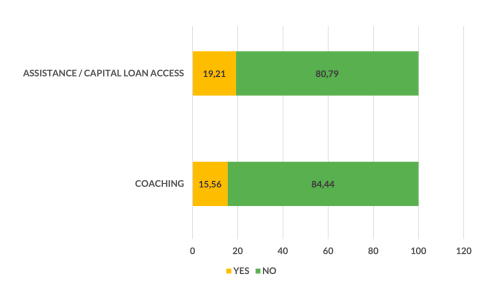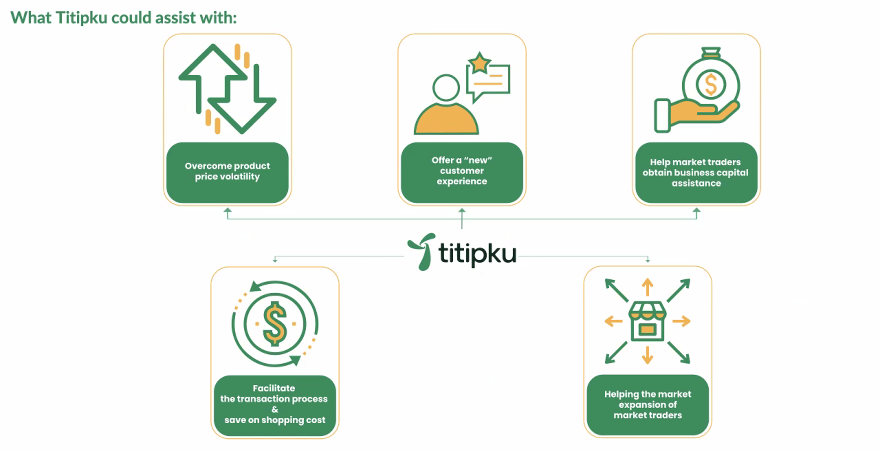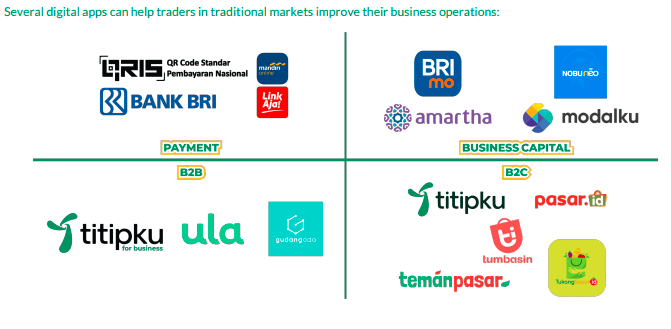The Role of Digitalization in Increasing Traditional Market Business
The three main things of concern are the supply chain, market conditions, and capital
After last year's successful launch report titled "Indonesia Online Groceries Report 2022", Titipku is again presenting further research with the big theme "Digitalization of Traditional Markets in Indonesia". If previously they focused on peeling the ins and outs online groceries and its potential, this latest research describes the role of technology in disrupting traditional markets in Indonesia.
Quoted from Katadata, the 2020 Market and Trade Center Directory Report recorded around 16.235 pass tradition spread throughout Indonesia. Java Island contributed the highest number with 5.949 units. Then followed by Sumatra with 4.896 units and Sulawesi with 2.165 units. Maluku and Papua have at least 453 people's markets.
Data from the Central Statistics Agency (BPS) for 2019 also shows that traditional markets are still the largest trading center in Indonesia (89%) compared to the number of shopping centers (3,7%) and supermarkets (7,3%). This figure shows that traditional markets are still in great demand by Indonesian people. One of them is because the price of the product is affordable.
The high distribution of traditional markets in Indonesia shows the great potential they have. A survey conducted by Nielsen in June 2020 stated that 58% of people prefer to shop at traditional markets, even during the pandemic. In 2021, wholesale sales in Indonesia reached $71,64 billion, 53,59% of total sales came from traditional markets.
Even though it has enormous potential, there are still several problems that traders in traditional markets often face. The three main things to pay attention to are supply chain, market conditionsand capital/capital. Here are some facts that support this statement.
From the supply chain side, for example, the high price of meat due to the long distribution chain makes consumers look for alternative products. This threatens the continuity of the beef traders' business. Apart from that, the increase in fuel prices in September 2022 also has the potential to increase the price of basic commodities, following the increase in prices of goods from farmers to traders.
Transportation subsidies from the government are also considered ineffective by the Executive Director of the Center for Economic and Legal Studies (Celios), Bhima Yudhistira. The reason is, there are many distribution points in the supply chain, starting from farmers, large distributors, retailers, to consumers. Bhima asked at what point transportation subsidies would be implemented.
Regarding market conditions, Katadata also stated that of the 16.235 markets in Indonesia in 2020, around 13,9% or 2.256 market units had never been renovated since operating. Apart from that, there are 218 traditional markets that have never been renovated even though they have been operating for more than 30 years. This has quite influenced the interest of buyers and traders in traditional markets.
Regarding business capital, General Chair of the Indonesian MSME Association Ikhsan Ingrabuh, saying that the government's program to reduce the People's Business Credit (KUR) interest rate from 7% to 6% is good, but this policy is considered less effective without easy access for MSME owners, they prefer fintech with high interest but easy access.

"Traders have limited capital. Today they sell, the money they earn is only to be turned over tomorrow. Meanwhile access to banks is difficult without financial reports or collateral. This is the role of Titipku as a company that focuses on market digitalization in bridging the needs of market traders with financing/ capital," said Titipku Co-Founder and CEO Henri Suhardja.
Innovation from a technological perspective
Bhima Yudhistira stated that this digital ecosystem for MSMEs and markets could be a solution in resolving supply chain problems that have been around for too long. It is also believed that digitalization can help traders gain easier access to business capital and reduce product price volatility.
Apart from that, innovation in technology can also help traditional market traders to expand their business reach and increase competition in the industry. Technology can also simplify the transaction process and save costs. This also provides a new experience to buyers.
“With MSMEs entering online/marketplace, MSMEs can get the opportunity to enter new markets. This means that MSMEs will be known more widely and will have the opportunity to be known by new potential customers, who have the potential to become customers. "In this way, MSMEs will not only depend on old customers, but will have new customers," said Henri.
Digital financial inclusion also allows MSMEs and market traders to optimize their business development. This is because financial inclusion and the implementation of appropriate digital solutions encourage MSMEs and the market to run business more effectively and efficiently. This allows traders to increase production capacity, expand markets, and even gain access to greater credit.
Titipku has a business model B2B which is in line with the benefits of digitalization, namely helping traders supply goods and providing capital assistance to access them. Traders can pick up their goods via Titipku. These goods are not subject to shipping costs so that the selling price is more stable and affordable to customers.
Having a transaction history in the application also makes it easier for traders to document their business so that it is easier to apply for capital assistance. Titipku refers merchants who qualify for capital support from banks. Titipku collaborates with Nobu Bank in this program.

More Coverage:
Minister of Cooperatives and SMEs Teten Masduki also said that several digital sectors in Indonesia are developing rapidly, such as e-commerce,edutech, property-tech, ride hailingand health-tech. In 2030, the value of digital transactions in Indonesia is estimated to reach IDR 160,4 trillion per platform, IDR 575 trillion, IDR 202,4 trillion, IDR 401 trillion and IDR 471,6 trillion.
It is projected that the value of digital economic transactions will grow to IDR 4.531 trillion in 2030 with the dominance of the e-commerce sector. For this reason, digitalization of MSMEs will be increasingly strategic. Meanwhile, in 2025 Google projects that the value of Indonesia's digital economy will reach USD 146 billion, and according to MPR Chairman Bambang Soesatyo, this must also be enjoyed by MSMEs.
In Indonesia itself, there are several digital platforms that can help traders in traditional markets to develop their business. Apart from Titipku, in the B2B realm there are Ula and WarehouseAda. In the B2C realm there is also pasar.id, kill, Market Friend and Vegetable Maker.

Sign up for our
newsletter
